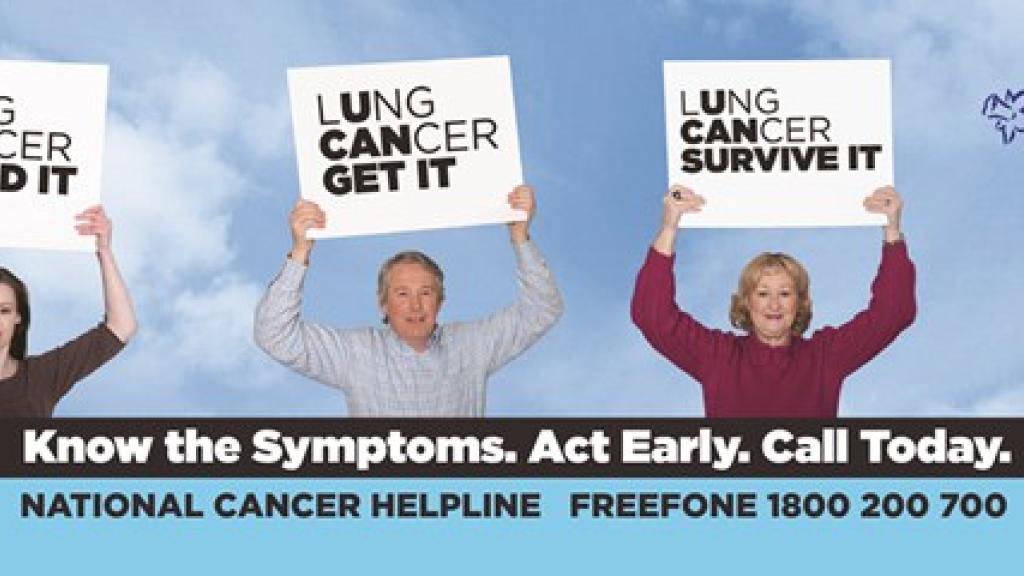
Irish Cancer Society Launches 2013 Lung Cancer Awareness Month
The Irish Cancer Society is launching its lung cancer awareness campaign for the month of January today and is encouraging everyone to be aware of the signs and symptoms of lung cancer and contact their GP or call the National Cancer Helpline Freefone 1800 200 700 if they are concerned. According to the most recent data 2,227 new cases of lung cancer were diagnosed in 2010 in Ireland, making it the fourth most common cancer after breast, prostate and bowel cancer. Lung Cancer however is the biggest cancer killer in Ireland with 1,708 people dying in 2010 (1,006 men and 702 women).
Ireland has the sixth highest incidence rate of lung cancer amongst women and the 32nd highest amongst men of 41 countries in Europe. Smoking is the key cause of lung cancer and the number of cases among women is expected to grow each year as we see the effect of increasing numbers of women smoking over the past 20 years take hold. New cases of lung cancer in women have increased by 17.6 percent in 2010. Lung cancer has overtaken breast cancer as the biggest cause of cancer death in women in Ireland. With early detection however, there is a real chance of effective treatment and potential cure. In the past, the late stage of presentation of lung cancer meant treatment options were limited, but now there is a clear plan to ensure that people are fast tracked through to early diagnosis and treatment. Rapid Access Clinics for lung cancer are in operation in all eight of the designated cancer centres. Aoife McNamara, Irish Cancer Society lung cancer specialist nurse said “The key to improving survival for lung cancer patients is early detection. This begins with people being aware of the signs and symptoms of lung cancer, going to see their GP if they are concerned and being referred on to a rapid access clinic for diagnosis and treatment. Awareness campaigns like the one the Society is launching today are vital as they are the first step in the chain. If people know the signs to look out for, they are more likely to go see their GP and get referred to a specialist.” The Society is strongly encouraging those concerned about lung cancer to call the Irish Cancer Society’s National Cancer Helpline on Freefone 1800 200 700, or to visit their GP. Through the National Cancer Helpline the Society supports patients and their families at every stage of their cancer journey and anyone with any concerns can ring in confidence and speak to a specialist nurse. The Irish Cancer Society’s specialist cancer nurses will be present for a live Facebook Q&A session from 2-4pm on Wednesday, January 16th for anyone affected by lung cancer. If you or someone you know would like to find out more about, visit the Facebook page www.facebook.com/IrishCancerSociety at 2pm next Wednesday. The Society also runs the National Smokers’ Quitline in conjunction with the HSE which offers one to one support to those who wish to stop smoking. More information is available by calling Callsave 1850 201 203 or visiting www.quit.ie. The Society has revised its publication “Look After Your Lungs” (Download PDF - 3.83MB) which is full of information and advice on how to improve your health and be aware of the early signs and symptoms of lung disease. Copies will be distributed through the Irish Daily Star and are available free from the National Cancer Helpline and Irish Cancer Society Daffodil Centres.
Symptoms of Lung Cancer
The symptoms of lung cancer may include any of the following:
- Difficulty breathing
- A cough that doesn't go away or a change in a long-term cough
- Repeated chest infections that won't go away even after antibiotics
- Wheezing
- Feeling more tired than usual
- A hoarse voice
- Coughing up blood-stained phlegm
- Pain in your chest, especially when you cough or breathe in
- Loss of appetite
- Weight loss
- Swelling around your face and neck
- Difficulty swallowing
* If you have any of the above symptoms, you must have them checked out by your doctor. But remember they can occur in many conditions other than cancer.
Click here for more information about Lung Cancer
